#the lost cause
Text
Kickstarting the audiobook of The Lost Cause, my novel of environmental hope
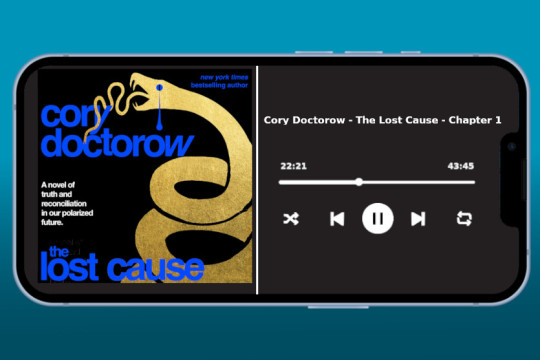
Tonight (October 2), I'm in Boise to host an event with VE Schwab. On October 7–8, I'm in Milan to keynote Wired Nextfest.

The Lost Cause is my next novel. It's about the climate emergency. It's hopeful. Library Journal called it "a message hope in a near-future that looks increasingly bleak." As with every other one of my books Amazon refuses to sell the audiobook, so I made my own, and I'm pre-selling it on Kickstarter:
https://www.kickstarter.com/projects/doctorow/the-lost-cause-a-novel-of-climate-and-hope
That's a lot to unpack, I know. So many questions! Including this one: "How is it that I have another book out in 2023?" Because this is my third book this year. Short answer: I write when I'm anxious, so I came out of lockdown with nine books. Nine!
Hope and writing are closely related activities. Hope (the belief that you can make things better) is nothing so cheap and fatalistic as optimism (the belief that things will improve no matter what you do). The Lost Cause is full of people who are full of hope.
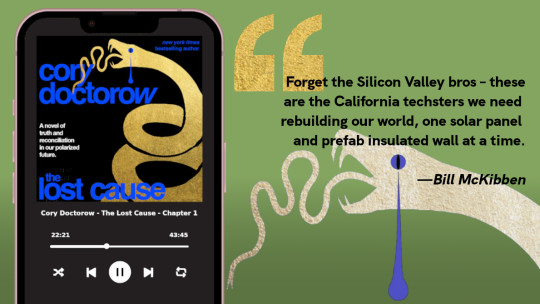
The action begins a full generation after the Hail Mary passage of the Green New Deal, and the people who grew up fighting the climate emergency (rather than sitting hopelessly by while the powers that be insisted that nothing could or should be done) have a name for themselves: they call themselves "the first generation in a century that doesn't fear the future."
I fear the future. Unchecked corporate power has us barreling over a cliff's edge and all the one-percent has to say is, "Well, it's too late to swerve now, what if the bus rolls and someone breaks a leg? Don't worry, we'll just keep speeding up and leap the gorge":
https://locusmag.com/2022/07/cory-doctorow-the-swerve/
That unchecked corporate power has no better avatar than Amazon, one of the tech monopolies that has converted the old, good internet into "five giant websites, each filled with screenshots of the other four":
https://twitter.com/tveastman/status/1069674780826071040
Amazon maintains a near-total grip over print and ebooks, but when it comes to audiobooks, that control is total. The company's Audible division has captured more than 90% of the market, and it abuses that dominance to cram Digital Rights Management onto every book it sells, even if the author doesn't want it:
https://pluralistic.net/2022/07/25/can-you-hear-me-now/#acx-ripoff
I wrote a whole-ass book about this and it came out less than a month ago; it's called The Internet Con and it lays out an audacious plan to halt the internet's enshittification and throw it into reverse:
http://www.seizethemeansofcomputation.org/
The tldr is this: when an audiobook is wrapped in Amazon's DRM, only Amazon can legally remove it. That means that every book I sell you on Audible is a book you have to throw away if you ever break up with Amazon, and Amazon can use the fact that it's hold you hostage to screw me – and every other author – over.
As I said last time this came up:
Fuck that sideways.
With a brick.

My books are sold without DRM, so you can play them in any app and do anything copyright permits, and that means Amazon won't carry them, and that means my publishers don't want to pay to produce them, and that means I produce them myself, and then I make the (significant) costs back by selling them on Kickstarter.
And you know what? It works. Readers don't want DRM. I mean, duh. No one woke up this morning and said, "Dammit, why won't someone sell me a product that lets me do less with my books?" I sell boatloads" of books through these crowdfunding campaigns. I sold so many copies of my last book, *The Internet Con, that they sold out the initial print run in two weeks (don't worry, they held back stock for my upcoming events).
But beyond that, I think there's another reason my readers keep coming back, even though I wrote a genuinely stupid number of books while working through lockdown anxiety while the wildfires raged and ashes sifted down out of the sky and settled on my laptop as I lay in my backyard hammock, pounding my keyboard.
(I went through two keyboards during lockdown. Thankfully, I bought a user-serviceable laptop from Framework and fixed it myself both times, in a matter of minutes. No, no one pays me to mention this, but hot damn is it cool.)
https://pluralistic.net/2022/11/13/graceful-failure/#frame
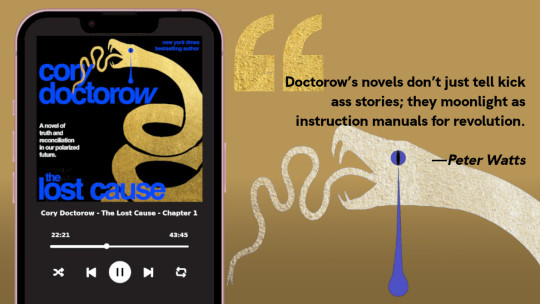
The reason readers come back to my books is that they're full of hope. In the same way that writing lets me feel like I'm not a passenger in life, but rather, someone with a say in my destination, the books that I write are full of practical ways and dramatic scenes in which other people seize the means of computation, the reins of power or their own destinies.
The protagonist of The Lost Cause is Brooks Palazzo, a high-school senior in Burbank whose parents were part of the original cohort of volunteers who kicked off the global transformation, and left him an orphan when they succumbed to one of the zoonotic plagues that arise every time another habitat is destroyed.
Brooks grew up knowing what his life would be: the work of repair and care, which millions of young people are doing. Relocating entire cities off endangered coastlines and floodplains, or out of fire-zones. Fighting floods and fires. Caring for tens of millions of refugees for whom the change came too late.
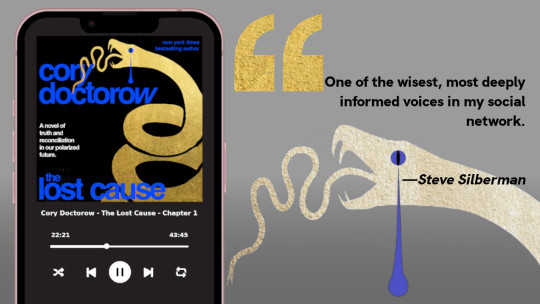
But with every revolution comes a counter-revolution. The losers of a just war don't dig holes, climb inside and pull the dirt down on top of themselves. Two groups of reactionaries – seagoing anarcho-capitalist billionaire wreckers and seething white nationalist militias – have formed an alliance.
They've already gotten their champion into the White House. Next up: dismantling every cause for hope Brooks and his friends have, and bringing back the fear.
That's the setup for a novel about solidarity, care, library socialism, and snatching victory from defeat's jaws. Writing it help keep me sane during the lockdown, and when it came time to record the audiobook, I spent a lot of time thinking about who could read it. I've had some great narrators: Wil Wheaton, @neil-gaiman, Amber Benson, Bronson Pinchot, and more.
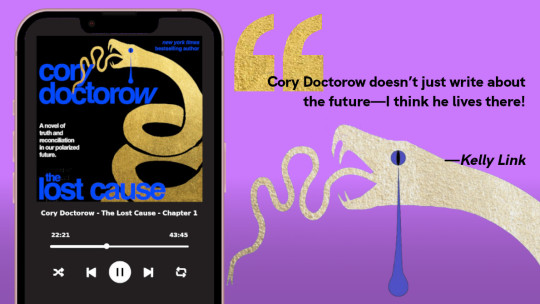
I record my audiobooks with Skyboat Media, a brilliant studio near my place in LA. Back in August, I spent a week in their recording booth – "The Tardis" – doing something I'd never tried before: I recorded a whole audiobook, with directorial supervision: The Internet Con:
https://transactions.sendowl.com/products/78992826/DEA0CE12/purchase
When it was done, the director – audiobook legend Gabrielle de Cuir – sat me down and said, "Look, I've never said this to an author before, but I think you should read The Lost Cause. I don't direct anyone anymore except for Wil Wheaton and LeVar Burton, but I would direct you on this one."
I was immensely flattered – and very nervous. Reading The Internet Con was one thing – the book is built around the speeches I've been giving for 20 years and I knew I could sell those lines – but The Lost Cause is a novel, with a whole cast of characters. Could I do it?
Reader, I did it. I just listened to the proofs last week and:
It.
Came.
Out.
Great.
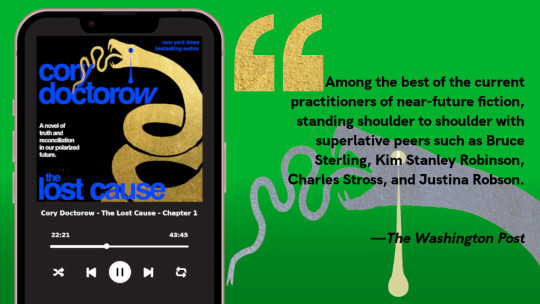
The Lost Cause goes on sale on November 14th, and I'll be selling this audiobook I made everywhere audiobooks are sold – except for the stores that require DRM, nonconsensually shackling readers and writers to their platforms. So you'll be able to get it on Libro.fm, downpour.com, even Google Play – but not Audible, Apple Books, or Audiobooks.com.
But in addition to those worthy retailers, I will be sending out thousands – and thousands! – of audiobook to my Kickstarter backers on the on-sale date, either as a folder of DRM-free MP3s, or as a download code for Libro.fm, to make things easy for people who don't want to have to figure out how to sideload an audiobook into a standalone app.
And, of course, the mobile duopoly have made this kind of sideloading exponentially harder over the past decade, though far be it from me to connect this with their policy of charging 30% commissions on everything sold through an app, a commission they don't receive if you get your files on the web and load 'em yourself:
https://www.kickstarter.com/projects/doctorow/red-team-blues-another-audiobook-that-amazon-wont-sell/posts/3788112
As with my previous Kickstarters, I'm also selling ebooks and hardcovers – signed or unsigned, and this time I've found a great partner to fulfill EU orders from within the EU, so backers won't have to pay VAT and customs charges. The wonderful Otherland – who have hosted me on my last two trips to Berlin – are going to manage that shipping for me:
https://www.otherland-berlin.de/en/home.html
Kim Stanley Robinson read the book and said, "Along with the rush of adrenaline I felt a solid surge of hope. May it go like this." That's just about the perfect quote, because the book is a ride. It's not just a kumbaya tale of a better world that is possible: it's a post-cyberpunk novel of high-tech guerrilla and meme warfare, climate tech and bad climate tech, wildcat prefab urban infill, and far-right militamen who adapt to a ban on assault-rifles by switching to super-soakers full of hydrochloric acid.
It's a book about struggle, hope in the darkness, and a way through this rotten moment. It's a book that dares to imagine that things might get worse but also better. This is a curious emotional melange, but it's one that I'm increasingly feeling these days.
Like, Amazon, that giant bully, whose blockade on DRM-free audiobooks cost me enough money to pay off my mortgage and put my kid through university (according to my agent)? The incredible Lina Khan brought a long-overdue antitrust case against Amazon while her rockstar DoJ counterpart, Jonathan Kanter, is dragging Google through the courts.
The EU is taking on Apple, and French cops are kicking down Nvidia's doors and grabbing their files, looking to build another antitrust case for monopolizing GPUs. The writers won their strike and Joe Biden walked the picket-line with the UAW, the first president in history to join striking workers:
https://doctorow.medium.com/joe-biden-is-headed-to-a-uaw-picket-line-in-detroit-f80bd0b372ab?sk=f3abdfd3f26d2f615ad9d2f1839bcc07

Solar is now our cheapest energy source, which is wild, because if we could only capture 0.4% of the solar energy that makes it through the atmosphere, we could give everyone alive the same energy budget as Canadians (who have American lifestyles but higher heating bills). As Deb Chachra writes in her forthcoming How Infrastructure Works (my review pending): we get a fresh supply of energy every time the sun rises and we only get new materials when a comet survives atmospheric entry, but we treat energy as scarce and throw away our materials after a single use:
https://www.penguinrandomhouse.com/books/612711/how-infrastructure-works-by-deb-chachra/
Anything that can't go on forever will eventually stop. We have shot past many of our planetary boundaries and there are waves of climate crises in our future, but they don't have to be climate disasters. That's up to us – it'll depend on whether we come together to save ourselves and each other, or tear ourselves apart.
The Lost Cause dares to imagine what it might be like if we do the former. We don't live in a post-enshittification world yet, but we could. With these indie audiobooks, I've found a way to treat the terminal enshittification of the Amazon monopoly as damage and route around it. I hope you'll back the Kickstarter, fight enshittification, inject some hope into your reading, and enjoy a kickass adventure novel in the process:
https://www.kickstarter.com/projects/doctorow/the-lost-cause-a-novel-of-climate-and-hope

If you'd like an essay-formatted version of this post to read or share, here's a link to it on pluralistic.net, my surveillance-free, ad-free, tracker-free blog:
https://pluralistic.net/2023/10/02/the-lost-cause/#the-first-generation-that-doesnt-fear-the-future
#pluralistic#audiobooks#the lost cause#crowdfunding#kickstarter#spoken word#climate#climate emergency#monopoly#drm#amazon#audible#skyboat#science fiction#hope not optimism
2K notes
·
View notes
Text
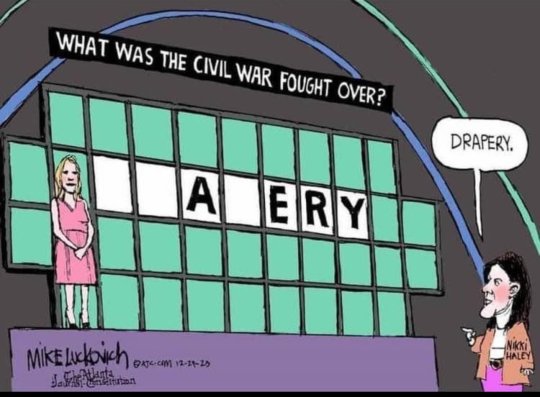
Mike Luckovich
* * * *
Why Nikki Haley’s answer omitting slavery as a cause of the Civil War matters.
What happened.
At a campaign event in New Hampshire, a member of the audience asked Nikki Haley to identify the causes of the Civil War. She gave an evasive answer that omitted slavery as a cause of the Civil War. She said,
I think the cause of the Civil War was basically how government was going to run. The freedoms and what people could and couldn’t do.
Haley was immediately attacked, mocked, and condemned for failing to identify slavery as a cause of the Civil War. During a Thursday morning interview, she attempted to walk back her prior answer with an equally offensive and unconvincing answer. As described in Forbes,
During the Thursday morning interview, she said the goal of the Civil War was to ensure each person has their freedom, including freedom of speech, freedom of religion and the “freedom to do and be anything they want to be without anyone or government getting in the way . . . Yes, I know it was about slavery. I’m from the South, of course I know it’s about slavery.”
Why it matters.
Haley has a history of minimizing or dismissing the role of slavery in the Civil War. The incident on Wednesday is merely the latest episode that reveals her willingness to cater to white nationalists in pursuit of elected office. As former New Jersey Governor Chris Christie said,
She's smart and she knows better. And she didn't say it because she's a racist. Because she's not. I know her well and I don't believe Nikki has a racist bone in her body . . . the reason she did it is just as bad, if not worse, and should make everybody concerned about her candidacy. She did it because she's unwilling to offend anyone by telling the truth.
If she is unwilling to stand up and say that slavery is what caused the Civil War because she's afraid of offending constituents in some other part of the country, if she's afraid to say that Donald Trump is unfit because she's afraid of offending people who support Donald Trump, . . .
What's going to happen when she has to stand up against forces in our own party who want to drag this country deeper and deeper into anger and division and exhaustion?”
Christie is right that Nikki Haley is afraid to tell the truth. But she is also a reactionary conservative posing as a moderate. As the NYTimes noted, her failure to include slavery threatens to destroy her image as someone attractive to moderate Republicans and independents. Per the Times,
Ms. Haley’s appeal as a candidate of moderation is mixed. As governor of South Carolina, she signed some of the harshest immigration and anti-abortion laws in the country at the time, as well as a stringent voter identification law that required photo ID at the ballot box.
But Haley’s omission of slavery was not merely an act of cowardice on her part. She was promoting a dangerous revisionist history of the Civil War that has taken root in the former Confederate states. Haley is promoting the myth of the “Lost Cause” of the South—a romanticized transformation of the brutal practice of slavery into (in the words of Haley) “traditions that are noble — traditions of history, of heritage, and of ancestry.”
I highly recommend a thoughtful and detailed discussion of Haley’s dangerous answer by Joshua Zeitz in Politico, Opinion | Why Was It So Hard for Nikki Haley to Say "Slavery"? Civil War History Has the Answer.
Zeitz writes,
The Lost Cause mythology was more than bad history. It provided the intellectual justification for Jim Crow — not just in the former Confederacy, but everywhere systemic racism denied Black citizens equal citizenship and economic rights. [¶]
With GOP presidential candidates waffling on the Civil War, rejecting history curricula in their states and launching political fusillades against “woke” culture, it remains for the rest of us to reaffirm the wisdom of Frederick Douglass, who in the last years of his life stated:
“Death has no power to change moral qualities. What was bad before the war, and during the war, has not been made good since the war. … Whatever else I may forget, I shall never forget the difference between those who fought for liberty and those who fought for slavery.”
Nikki Haley wants to forget “the difference between those who fought for liberty and those who fought for slavery.” In pursuit of the presidency, she recasts “fighting for slavery” as “noble traditions of history, heritage, and ancestry.” Shame on her.
Haley is telling us who she is. We should believe her.
Robert B. Hubbell Newsletter
#Robert B. Hubbell#Robert B. Hubbell newsletter#Nikki Haley#the civil war#slavery#the old south#White supremacy#The Lost Cause#Mike Luckovich
42 notes
·
View notes
Text
#History#Presidents#John F. Kennedy#JFK#President Kennedy#The Atlantic#Reconstruction#The Lost Cause#Confederacy#Adelbert Ames#Lucius Quintus Cincinnatus Lamar#Profiles In Courage#George Plimpton#Civil War#Blanche Ames#Confederate Mythology
8 notes
·
View notes
Text
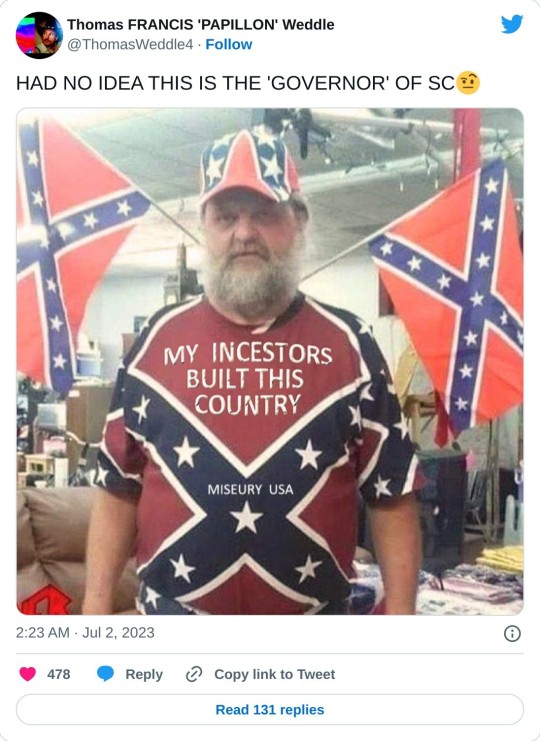
when I see people with these great big "x's" on I start thinking to myself and wondering do they not realize they are a big ass target all over their whole existence?
19 notes
·
View notes
Text
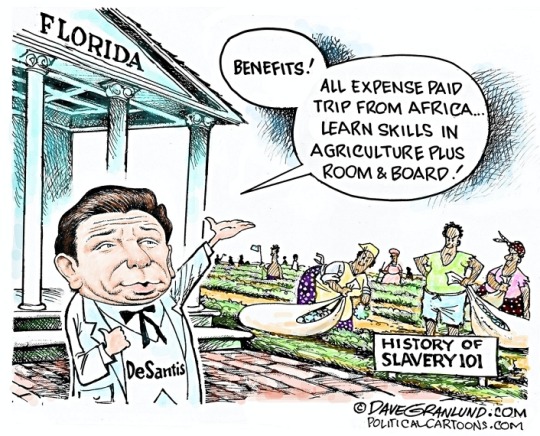
A new Florida classic about slavery: "Uncle Ron's Cabin"
An additional tie-in to the Confederacy: the DeSantis campaign is becoming the lost cause of 2023.
#ron desantis#florida#republicans#uncle ron's cabin#slavery#black history#confederate states of america#desantis campaign#the lost cause#election 2024#gop presidential nomination#dave granlund
8 notes
·
View notes
Text
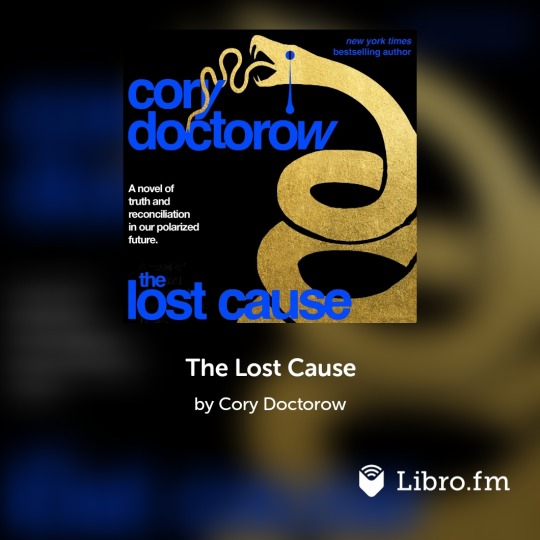
Ya salió el nuevo libro de Cory Doctorow, de nueva cuenta un Kickstarter muy exitoso y las versiones digitales libres de DRM.
2 notes
·
View notes
Text
@mobscene-awards
ACCEPTANCE SPEECH: The Lost Cause.
‘’Olivier Fontaine.’’
He heard it before he realised all eyes were on him, drinking half to his lips before he groaned. He honestly thought he’d gotten away with it. But he couldn’t get two years of good luck, could he. Last year he’d managed to dodge his nominations.
This year didn’t have the same plans.
Olivier's heart pounded within his chest as he ascended the stage, his legs shaking like a quivering leaf in a stormy breeze. His palms were slick with sweat, his throat parched, and his mind abuzz with a maelstrom of thoughts and emotions. ‘’I mean, thanks?’’ Olivier looked up before he broke into a laugh. ‘’Way to fucked for this --- okay, who ever voted for me? Fuck you and thanks for the free drinks tonight.’’ He gave the room a flashy grin before he bolted.

3 notes
·
View notes
Text
the 'what if you played it a little risky' post literally Changed my life but i cant fujkign find it in my blog because its. a tiktok screenshot
#like literally every time ive hesitated sending a text or complimenting someone or stuff ive thought of it#like youre right. what if i played it a little risky what do i have to lose in doing a nice thing!!!!!! ur so right!!!!!!!!#but its forever lost cos i cant search it with any words cause its an image#misery and pain. you know how it is#my post
53K notes
·
View notes
Text
yes, doctors suck, but also "the medical ethics and patient interaction training doctors receive reinforces ableism" and "the hyper competitive medical school application process roots out the poor, the disabled, and those who would diversify the field" and "anti-establishment sentiment gets applications rejected and promotions requests denied, weeding out the doctors on our side" and "the gruesome nature of the job and the complete lack of mental health support for medical practitioners breeds apathy towards patients" and "insurance companies often define treatment solely on a cost-analysis basis" and "doctors take on such overwhelming student loan debt they have no choice but to pursue high paying jobs at the expense of their morals" are all also true
none of this absolves doctors of the truly horrendous things they say and do to patients, but it's important to acknowledge that rather than every doctor being coincidentally a bad person, there is something specific about this field and career path that gives rise to such high prevalence of ableist attitudes
and I WILL elaborate happily
#theres so much that contributes to this#and its such a traditional field that any change takes ten years to take effect even when its not as controversial as disability rights#ive no lost love for doctors as a whole#but the deeper causes here need to be examined to understand how this problem manifested and what can be done to fix it#disability#chronic illness#ableism#premed#medicine#salt baby talks
20K notes
·
View notes
Text
I've yet to read a disappointing book by Cory Doctorow. The Lost Cause is amazing, and I love how it takes on the political climate of the near future. It's hopeful for future while being realistic about what it might look like if we keep on the same path we are now. Recommended reading for everyone, just like Walkaway. I highlighted a dozen or so moments in Literal, and wish I could emboss them onto everyone's minds. I loved how Cory Doctorow took apart so much of the individualistic, conservative argument while also showing that they aren't evil monsters; they're people, people who want their communities and families to survive. 10/10
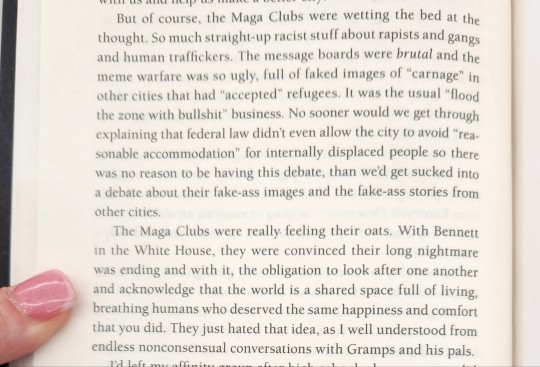


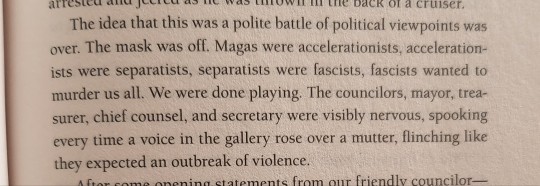

0 notes
Text
Insurance companies are making climate risk worse
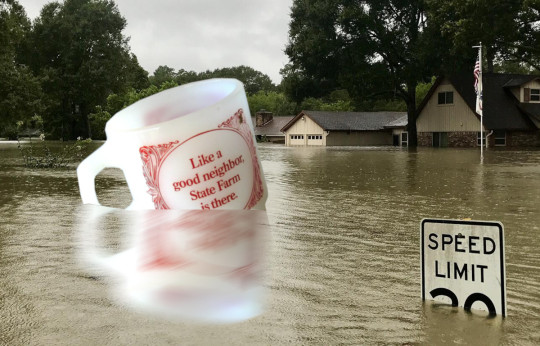
Tomorrow (November 29), I'm at NYC's Strand Books with my novel The Lost Cause, a solarpunk tale of hope and danger that Rebecca Solnit called "completely delightful."

Conservatives may deride the "reality-based community" as a drag on progress and commercial expansion, but even the most noxious pump-and-dump capitalism is supposed to remain tethered to reality by two unbreakable fetters: auditing and insurance:
https://en.wikipedia.org/wiki/Reality-based_community
No matter how much you value profit over ethics or human thriving, you still need honest books – even if you never show those books to the taxman or the marks. Even an outright scammer needs to know what's coming in and what's going out so they don't get caught in a liquidity trap (that is, "broke"), or overleveraged ("broke," again) exposed to market changes (you guessed it: "broke").
Unfortunately for capitalism, auditing is on its deathbed. The market is sewn up by the wildly corrupt and conflicted Big Four accounting firms that are the very definition of too big to fail/too big to jail. They keep cooking books on behalf of management to the detriment of investors. These double-entry fabrications conceal rot in giant, structurally important firms until they implode spectacularly and suddenly, leaving workers, suppliers, customers and investors in a state of utter higgeldy-piggeldy:
https://pluralistic.net/2022/11/29/great-andersens-ghost/#mene-mene-bezzle
In helping corporations defraud institutional investors, auditors are facilitating mass scale millionaire-on-billionaire violence, and while that may seem like the kind of fight where you're happy to see either party lose, there are inevitably a lot of noncombatants in the blast radius. Since the Enron collapse, the entire accounting sector has turned to quicksand, which is a big deal, given that it's what industrial capitalism's foundations are anchored to. There's a reason my last novel was a thriller about forensic accounting and Big Tech:
https://us.macmillan.com/books/9781250865847/red-team-blues
But accounting isn't the only bedrock that's been reduced to slurry here in capitalism's end-times. The insurance sector is meant to be an unshakably rational enterprise, imposing discipline on the rest of the economy. Sure, your company can do something stupid and reckless, but the insurance bill will be stonking, sufficient to consume the expected additional profits.
But the crash of 2008 made it clear that the largest insurance companies in the world were capable of the same wishful thinking, motivated reasoning, and short-termism that they were supposed to prevent in every other business. Without AIG – one of the largest insurers in the world – there would have been no Great Financial Crisis. The company knowingly underwrote hundreds of billions of dollars in junk bonds dressed up as AAA debt, and required a $180b bailout.
Still, many of us have nursed an ember of hope that the insurance sector would spur Big Finance and its pocket governments into taking the climate emergency seriously. When rising seas and wildfires and zoonotic plagues and famines and rolling refugee crises make cities, businesses, and homes uninsurable risks, then insurers will stop writing policies and the doom will become undeniable. Money talks, bullshit walks.
But while insurers have begun to withdraw from the most climate-endangered places (or crank up premiums), the net effect is to decrease climate resilience and increase risk, creating a "climate risk doom loop" that Advait Arun lays out brilliantly for Phenomenal World:
https://www.phenomenalworld.org/analysis/the-doom-loop/
Part of the problem is political: as people move into high-risk areas (flood-prone coastal cities, fire-threatened urban-wildlife interfaces), politicians are pulling out all the stops to keep insurers from disinvesting in these high-risk zones. They're loosening insurance regs, subsidizing policies, and imposing "disaster risk fees" on everyone in the region.
But the insurance companies themselves are simply not responding aggressively enough to the rising risk. Climate risk is correlated, after all: when everyone in a region is at flood risk, then everyone will be making a claim on the insurance company when the waters come. The insurance trick of spreading risk only works if the risks to everyone in that spread aren't correlated.
Perversely, insurance companies are heavily invested in fossil fuel companies, these being reliable money-spinners where an insurer can park and grow your premiums, on the assumption that most of the people in the risk pool won't file claims at the same time. But those same fossil-fuel assets produce the very correlated risk that could bring down the whole system.
The system is in trouble. US claims from "natural disasters" are topping $100b/year – up from $4.6b in 2000. Home insurance premiums are up (21%!), but it's not enough, especially in drowning Florida and Texas (which is also both roasting and freezing):
https://grist.org/economics/as-climate-risks-mount-the-insurance-safety-net-is-collapsing/
Insurers who put premiums up to cover this new risk run into a paradox: the higher premiums get, the more risk-tolerant customers get. When flood insurance is cheap, lots of homeowners will stump up for it and create a big, uncorrelated risk-pool. When premiums skyrocket, the only people who buy flood policies are homeowners who are dead certain their house is gonna get flooded out and soon. Now you have a risk pool consisting solely of highly correlated, high risk homes. The technical term for this in the insurance trade is: "bad."
But it gets worse: people who decide not to buy policies as prices go up may be doing their own "motivated reasoning" and "mispricing their risk." That is, they may decide, "If I can't afford to move, and I can't afford to sell my house because it's in a flood-zone, and I can't afford insurance, I guess that means I'm going to live here and be uninsured and hope for the best."
This is also bad. The amount of uninsured losses from US climate disaster "dwarfs" insured losses:
https://www.reuters.com/business/environment/hurricanes-floods-bring-120-billion-insurance-losses-2022-2023-01-09/
Here's the doom-loop in a nutshell:
As carbon emissions continue to accumulate, more people are put at risk of climate disaster, while the damages from those disasters intensifies. Vulnerability will drive disinvestment, which in turn exacerbates vulnerability.
Also: the browner and poorer you are, the worse you have it: you are impacted "first and worst":
https://www.climaterealityproject.org/frontline-fenceline-communities
As Arun writes, "Tinkering with insurance markets will not solve their real issues—we must patch the gaping holes in the financial system itself." We have to end the loop that sees the poorest places least insured, and the loss of insurance leading to abandonment by people with money and agency, which zeroes out the budget for climate remediation and resiliency where it is most needed.
The insurance sector is part of the finance industry, and it is disinvesting in climate-endagered places and instead doubling down on its bets on fossil fuels. We can't rely on the insurance sector to discipline other industries by generating "price signals" about the true underlying climate risk. And insurance doesn't just invest in fossil fuels – they're also a major buyer of municipal and state bonds, which means they're part of the "bond vigilante" investors whose decisions constrain the ability of cities to raise and spend money for climate remediation.
When American cities, territories and regions can't float bonds, they historically get taken over and handed to an unelected "control board" who represents distant creditors, not citizens. This is especially true when the people who live in those places are Black or brown – think Puerto Rico or Detroit or Flint. These control board administrators make creditors whole by tearing the people apart.
This is the real doom loop: insurers pull out of poor places threatened by climate disasters. They invest in the fossil fuels that worsen those disasters. They join with bond vigilantes to force disinvestment from infrastructure maintenance and resiliency in those places. Then, the next climate disaster creates more uninsured losses. Lather, rinse, repeat.
Finance and insurance are betting heavily on climate risk modeling – not to avert this crisis, but to ensure that their finances remain intact though it. What's more, it won't work. As climate effects get bigger, they get less predictable – and harder to avoid. The point of insurance is spreading risk, not reducing it. We shouldn't and can't rely on insurance creating price-signals to reduce our climate risk.
But the climate doom-loop can be put in reverse – not by market spending, but by public spending. As Arun writes, we need to create "a global investment architecture that is safe for spending":
https://tanjasail.wordpress.com/2023/10/06/a-world-safe-for-spending/
Public investment in emissions reduction and resiliency can offset climate risk, by reducing future global warming and by making places better prepared to endure the weather and other events that are locked in by past emissions. A just transition will "loosen liquidity constraints on investment in communities made vulnerable by the financial system."
Austerity is a bad investment strategy. Failure to maintain and improve infrastructure doesn't just shift costs into the future, it increases those costs far in excess of any rational discount based on the time value of money. Public institutions should discipline markets, not the other way around. Don't give Wall Street a veto over our climate spending. A National Investment Authority could subordinate markets to human thriving:
https://democracyjournal.org/arguments/industrial-policy-requires-public-not-just-private-equity/
Insurance need not be pitted against human survival. Saving the cities and regions whose bonds are held by insurance companies is good for those companies: "Breaking the climate risk doom loop is the best disaster insurance policy money can buy."
I found Arun's work to be especially bracing because of the book I'm touring now, The Lost Cause, a solarpunk novel set in a world in which vast public investment is being made to address the climate emergency that is everywhere and all at once:
https://us.macmillan.com/books/9781250865939/the-lost-cause
There is something profoundly hopeful about the belief that we can do something about these foreseeable disasters – rather than remaining frozen in place until the disaster is upon us and it's too late. As Rebecca Solnit says, inhabiting this place in your imagination is "Completely delightful. Neither utopian nor dystopian, it portrays life in SoCal in a future woven from our successes (Green New Deal!), failures (climate chaos anyway), and unresolved conflicts (old MAGA dudes). I loved it."

If you'd like an essay-formatted version of this post to read or share, here's a link to it on pluralistic.net, my surveillance-free, ad-free, tracker-free blog:
https://pluralistic.net/2023/11/28/re-re-reinsurance/#useless-price-signals
#pluralistic#doom loop#insurance#insuretech#climate#climate risk#climate emergency#the lost cause#market forces#risk management#price signals#control boards#decarbonization#bond vigilantes#climate resilience
262 notes
·
View notes
Text
There's always people theorizing how the Batfamily hides Jason disappearance and reappearance, but I literally haven't seen anyone use the best explanation: Witness Protection.
Like this literally answers every question. The Death Certificate? They had to fake his death. The empty grave? Obviously it had to be believable. The time when Wayne Heir "Richie Wayne" refused to step foot in Gotham and talk to his father? He was pissed about Jason's (non) death. Brucie Wayne's very real depression after his death? Well he lost contact with his son and he was under immense stress from the government.
Like this literally answers every question I can come up with. Why has no one said he was in witness protection? And if people have done it, send me fics and prompts because I'm obsessed.
And the best part is, the Waynes are so stupidly rich that they could pull it off. Lex Luther could try and conduct his own investigation but somehow he can never find anything concrete. And if he gets too close either Babs hacks them or Tim just calls up Conner for a distraction.
One time Jason gets cornered and asked how he felt about returning to his life after being in Witness Protection. Unfortunately, him and Bruce weren't on the best terms to explain the whole story but he comes in clutch. He spins the tale about how heartbroken he was to see his brother, father and grandfather grieving and how honored he was when he learnt his new little brother idolized him. Tim got ahold of a copy of the interview and will never let Jason live it down.
The media doesn't ask Bruce questions about Jason's death because last time they did he broke down and a suddenly furious reporter chastised them and reminded them that while Jason may be alive Bruce still mourned his death. The picture of Bruce in tears at the interview is currently one of Jason's favourite lockscreens.
Same goes for Dick. Any questions of his brother's death results in (1) Richie Wayne ready to throw hands at any and everybody, (2) his wife (well one of them) Barbara Gordon threatening the reporters or (3) That same Metropolis reporter chastising the whole community again.
#dc comics#batfam#bruce wayne#jason todd#yes the reporter is clark#hes ready to fight for b and dick#vicky vale wonders if jason todd wayne was in witness protection due to something involving the red hood#jason goes on twitter and bashes the red hood's whole persona#dick grayson retweets that red hood is trying and is just a little lost#the official batman twitter likes that tweet#it causes a huge mess for both barbara and jim gordon to clean up#they knew they shouldn't have gotten involved with gothams pet billionaire and his weird kids
6K notes
·
View notes
Photo


(not) your guy in the chair
#milesganke#miles morales#ganke lee#my art#atsv#atsv spoilers#across the spiderverse#into the spiderverse#spiderman#spider-man#me vs pichelli's style and i lost HARD. but its ok. milesganke in every universe <3#idk how to feel about these cause they dont look like they flow into each other#but we move on. i need to do work thats not spiderman fanart...
11K notes
·
View notes
Link
The removal of the names of Confederates from US military bases is proceeding.
Fort Lee, the U.S. Army's Virginia garrison named after the slave-holding leader of Confederate forces during the Civil War, became Fort Gregg-Adams on Thursday in a ceremony that renamed the base after two Black officers whose struggles paved the way for a more inclusive military.
The post is one of nine that the Pentagon has said will be redesignated to remove names, symbols or other displays that commemorate the Confederacy.
Lt. Gen. Arthur Gregg, the first African American to achieve such a high rank, retired in 1981 after serving as the Army's deputy chief of staff, logistics. He becomes the only living soldier in modern history to have an installation named in his honor. Lt. Col. Charity Adams joined the newly created Women's Army Auxiliary Corps in 1942 and was the highest-ranking Black woman of World War II.
Not many US military installations are named after living persons.
Looking back on his career, Gregg said he started out in an Army that was split in two, "one Black and one white."
[ ... ]
Upon learning a few months ago that Fort Lee would be renamed for him, "I was more than pleased," he said.
"I had a very strong connection with Fort Lee, which is clearly one of my favorite posts in [the] Army, and I was very happy and very honored."
Gregg, speaking at Thursday's ceremony, thanked his late wife, his family and his mentors in the Army, among them, his platoon sergeant from basic training. "His teaching and personal example served me well during my career," Gregg said.
Just as Germany was de-Nazified after World War II, the South needs belatedly to be de-Confederatized. The Confederate States of America was headed by a group of slaveholding traitors to the US. Reconstruction was abruptly ended early due to a deal which installed Republican Rutherford B. Hayes in the White House after a disputed election. The premature ending of Reconstruction enshrined Jim Crow and tacitly permitted the KKK and other terrorist groups to flourish.
The renaming of these bases offers further recognition that the “Lost Cause” is lost for good.
#us armed forces#renaming military bases#fort lee#fort gregg-adams#virginia#charity adams#arthur gregg#de-confederatization#the south#us civil war#reconstruction#the lost cause
1 note
·
View note